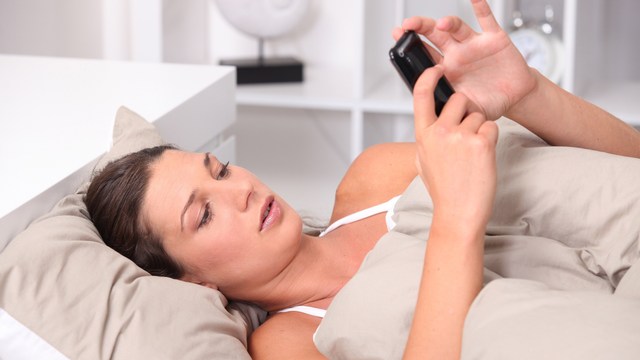 Auremar/PhotoSpin
Auremar/PhotoSpin
If you’re losing an ongoing battle with your alarm’s snooze button, or if you have to staple your eyelids open and down a cup of coffee in order to function, then welcome to the overpopulated and well-caffeinated world of sleep deprivation.
Sleep deprivation is the result of not sleeping enough, according to the National Heart, Lung, and Blood Institute.
The concept of sleep deficiency is slightly different. You may be suffering from sleep deficiency if you suffer from one or more of these issues:
- Sleep deprivation
- Sleeping at the incorrect time of day
- Having difficulties sleeping soundly
- Not benefiting from all sleep types (REM and non-REM) required by the body
- Suffering from a sleep disorder like insomnia
Although you can feel the initial physical effect of sleep deprivation, which is fatigue/drowsiness, you might not realize that depriving yourself of sleep time (at least seven to eight hours a day for adults) can also have mental health consequences.
In fact, two recent studies showed a relationship between depression and sleep duration.
In a study published in the journal Sleep involving adult twins, researchers looked at how genetics play a role in the environment, especially when it comes to sleep duration and depression.
The results implied that twins who only slept five hours a night (short sleep duration) were much more likely to be genetically disposed to developing depression (53 percent total heritability of depressive symptoms) than those who slept for an average amount of time of 7-8.9 hours (27 percent).
Twins who overslept at 10 hours a night still had a higher risk than normal (49 percent), but less than sleep-deprived adults.
Another study in Sleep focused on data for over 4,000 adolescents ages 11-17, and found that teens who slept six or less hours a day were more at risk for developing major depression. This in turn starts a cycle, since major depression can be a risk factor for sleep deficiency and deprivation.
An article in the New York Times pointed to another effect of sleep deprivation. It can affect our work productivity by impacting our mental and social skills, including making us cranky, lethargic and poor at decision-making.
The author, Sendhil Mullainathan, also mentioned that we might waste more time at work when we’re sleep deprived, and we might have more difficulties with memory, learning and creativity. Sleep deprivation can also affect how social and optimistic we are.
Dr. Shimi Kang, a psychiatrist and the medical director of Child and Youth Mental Health for Vancouver Coastal Health, said in an email that sleep deprivation can have multiple mental health side effects including anxiety, depression, sluggishness, irritability and “eventual psychosis.”
It is sometimes associated with violent behavior as well, she said.
“We humans have forgotten what it means to be human, and our basic biologic processes are considered luxuries rather than necessities,” Kang said. “We have equated being rested to being lazy, and being sleep deprived as being driven.”
“We need to redefine our priorities towards greater balance, which ultimately leads to self-motivation,” she added.
She said mental health issues can result from sleep deprivation due to biological processes not being fulfilled.
“We are rewarded with powerful neurochemicals when we sleep that serves to organize our brains,” Kang said. “Without sleep, we lack the process of higher cognitive rejuvenation.”
She added that further secondary mental health issues can develop, such as anxiety from sleep deficiency, which can make school or work challenging to the point of having performance issues, which can in turn cause feelings of depression.
Although it’s ingrained in our brains to be superwomen, Kang said it’s possible for women to get more sleep.
“Women can reject perfectionism – it is an unrealistic standard that is never attained and highly damaging,” she said.
She added that women can also have “status anxiety” and try to keep up with others to impress them, which is unnecessary. She said it’s important for women to do a better job at unburdening themselves.
This can be done by delegating tasks to other people, and letting go of unimportant frivolous aspects of life that are taking away precious time (like constantly updating Facebook).
Women also have to keep in mind that hormonal changes could impact sleep, she said.
She suggests cutting caffeine after 2 p.m., sleeping always on a bed (not a couch), sleeping with no lights on, and avoiding using screens before bedtime (TV, computer, phone, etc.).
Sources:
National Heart, Lung, and Blood Institute. What Are Sleep Deprivation and Deficiency? Web. February 5, 2014.
https://www.nhlbi.nih.gov/health/health-topics/topics/sdd
ScienceDaily. New links founds between sleep duration, depression. Web. February 6, 2014.
http://www.sciencedaily.com/releases/2014/01/140131230851.htm
Mullainathan, Sendhil. The New York Times. Get Some Sleep, and Wake up the G.D.P. Web. February 6, 2014.
http://www.nytimes.com/2014/02/02/business/get-some-sleep-and-wake-up-the-gdp.html?ref=health&_r=0
Kang, Shimi. Email interview. February 5, 2014.
http://www.drshimikang.com/bio.html
Reviewed February 6, 2014
by Michele Blacksberg RN
Edited by Jody Smith





Add a CommentComments
There are no comments yet. Be the first one and get the conversation started!